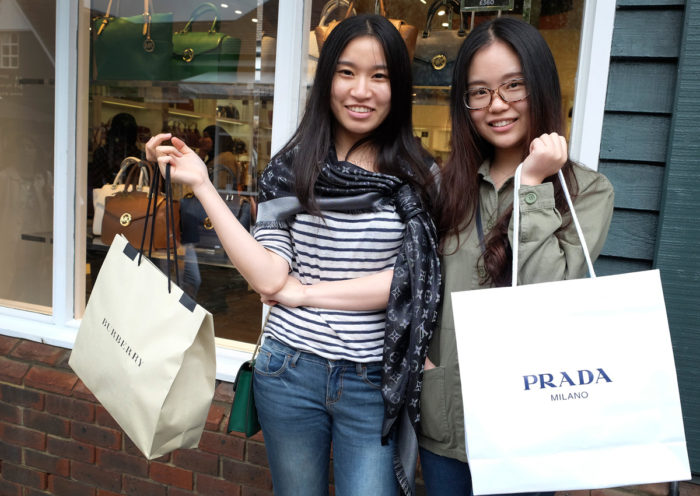Published in the Nikkei Asian Review 27/6/2018
I’m in a place where you can save money by spending it. Here, for example, is a green leather coat from Hugo Boss that once cost two thousand pounds, but now sells for a mere five hundred. Many similar bargains are available on this boutique-lined boulevard that reportedly matches the length of the Champs-Elysées.
All around me brand-addicted shoppers are loading up on the offerings of Givenchy, Balanciega, Lagerfeld, Ferragamo, Kenzo, Jimmy, Vivienne, Stella; altogether one hundred and sixty “outlet” stores, offering hands-free shopping and multilingual assistance. You could be in Dubai or Singapore. Except that the birdsong is real, the air is not conditioned and off to the side are the cow-dotted meadows of the rolling English countryside.
The market town of Bicester derives from a seventh century Saxon settlement and lies just a dozen miles from the dreaming spires of Oxford. In the twenty first century it has developed an extraordinary appendage, Bicester Village, a shopaholic paradise that caters to discount-hungry tourists, most of whom have travelled halfway around the world for a dose of high-end retail therapy.
In so doing, they are defying one of the most powerful trends in the world economy today – “Amazonification,” meaning the relentless growth of internet commerce and the associated decline of traditional bricks-and-mortar stores. People want to come to Bicester Village and indulge in the social activity of going shopping with friends and partners. Clicking an icon on a computer screen while lying in bed is no substitute.
To facilitate the process, Chiltern Railways have put on a service like none other on Britain’s sometimes dysfunctional rail network. Announcements are made in Mandarin and Arabic and you are greeted by smiling staff in red bell-boy uniforms. The station reception area smells like a French parfumerie.
The numbers speak for themselves. Bicester Village attracts more visitors than any other destination in Britain except for Buckingham Palace. Recently it has expanded, setting up similar outlet villages in Spain, Italy, Germany, China and elsewhere. Together the home territory and its sprinkling of overseas outposts attracted forty million visitors in 2017, exceeding annual tourist arrivals in one of Asia’s top destinations, Thailand.
Like the British Royal Family and Premier League football, Bicester Village has gone global. The management company, Value Retail, is British but the entrepreneur who owns it is a UK-based American. Most of the star brands are foreign, but some promising homegrown talent is on display too. And the fastest growing market is Asia, with its aspirational and increasingly mobile middle classes. The management even puts on a Chinese New Year’s celebration, complete with dragon dance.
More Bicester-ization
You will not like Bicester Village if you have a problem with conspicuous consumption, or if you object to the citizens of countries that were impoverished for most of the twentieth century spending their newly acquired wealth as they think fit. But here’s the thing – if you don’t like it, don’t go there. Bicester Village works because it is custom-made for the function it performs. Nobody is going to complain about the tourists because there is nobody there but tourists.
We now live in a world of structural “over-tourism.” Such has been the pressure of huge numbers on famous monuments and historical towns never intended to accommodate them that there have been anti-tourist demonstrations in some European cities. Barcelona – with a population of 1.6 million and tourist visits of 32 million in 2016 – is responding by raising taxes and charges, forbidding new hotel openings and cracking down on unlicensed apartment rentals.
Yet the global tourist boom may only now be getting started. A mere 9% of the Chinese population has passports, compared with 40% of Americans and 50% of South Koreans. The China Outbound Tourism Research Institute predicts that overseas trips by Chinese will increase from 145m last year to more than 400m by 2030
Where are all these people going to go? Barcelona’s attempt to cap visitor numbers may be copied but will lead to skyrocketing prices and only shift the problem elsewhere. The obvious answer is “Bicester-ization” on a much grander scale. Not single-street villages, but whole towns with their own stations and even airports, purpose-built in underpopulated areas and packed with malls, hotels, casinos and amusement parks. People interested in the local culture could take virtual reality tours. It would be a mixture of Macau, Disneyland and Pokemon Go.
As for that Hugo Boss coat, it turns out they didn’t have my size. My only purchases of the afternoon were a double espresso and an artisanal ice-cream. Neither was a bargain.


